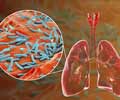Identification of rare genetic markers in Mycobacterium tuberculosis may help improve the early detection of drug-resistant strains of the disease.

‘Identification of rare genetic markers in Mycobacterium tuberculosis may help improve the early detection of drug-resistant strains of the disease, thereby aiding to prevent their spread.’





Moreover, the TB strains with rare mechanisms of resistance elude molecular detection on tests. Hence, the study team thereby searched for rare genetic mutations associated with resistance by obtaining the samples of M. tuberculosis from seven different countries where antibiotic resistance is common. Genetic Markers of TB
“They (resistant TB strains) don’t have the common genetic markers, but they are resistant.” This leads clinicians to incorrectly conclude that standard TB drugs will kill the bacteria. “And so the patient is given the wrong medications and continues to infect others for weeks — sometimes months — before they realize that these drugs aren’t working. So we really want to prevent that,” says Faramarz Valafar, San Diego State University.It was found that there was one set of rare genetic mutations that may help block the common TB drug kanamycin from its action against the disease.
“The practice of going in and really looking for these unexplained cases, bringing them in, sequencing them, is a large, expensive project, but it needs to be done in order to find these rare cases so that they don’t slip through the cracks and spread, causing more antibiotic resistance that just goes undetected,” says Derek Conkle-Gutierrez, San Diego State University.
The study team has also received a grant to directly sequence drug-resistant TB from infected lung tissue, thereby striving to contribute to breakthrough findings for the tuberculosis research community.
Advertisement














